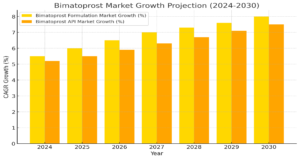
Sourcing Bimatoprost API for pharmaceutical or cosmetic formulations is not just a purchase—it’s a critical regulatory and quality decision. Whether you’re formulating for glaucoma, ocular hypertension, or eyelash growth, the success of your product depends heavily on the quality, purity, and compliance of your API.
Unfortunately, many buyers—especially new formulators or bulk traders—make costly mistakes when choosing a Bimatoprost API supplier.
This guide covers the top sourcing mistakes and shows you how to avoid compliance risks, delivery delays, and regulatory setbacks.
1. Ignoring GMP Certification or Choosing Non-Compliant Manufacturers
❌ The Mistake:
Choosing a supplier that does not have valid GMP certification, or worse, relying on verbal assurance without official documentation.
🔍 Why It’s Risky:
- APIs used in ophthalmic and cosmetic formulations must be GMP-compliant
- Regulatory authorities (FDA, EMA, ANVISA) require it for import approval
- Non-GMP API can lead to product rejection, recalls, or legal penalties
✅ How to Avoid It:
- Ask for a valid GMP, EU-GMP, or US FDA GMP certificate
- Check if the certificate is current and site-specific
- Verify manufacturer details with certifying authority if in doubt
2. Not Requesting Complete Documentation
❌ The Mistake:
Placing orders without ensuring the supplier can provide key compliance documents.
🔍 What’s Missing:
- CoA (Certificate of Analysis)
- DMF or Letter of Access
- MSDS
- Impurity profile
- Stability data
- TSE/BSE Declaration
✅ How to Avoid It:
Create a documentation checklist and only shortlist suppliers who agree to provide:
| Document | Why You Need It |
|---|---|
| CoA | Confirms assay, purity, impurities |
| DMF/CEP/ASMF | For regulatory submission |
| MSDS | Safety & handling compliance |
| Stability data | Ensures shelf life during global transport |
| GMP certificate | Mandatory for most pharma registrations |
3. Failing to Validate Packaging & Labeling Standards
❌ The Mistake:
Overlooking how the API is packed or labeled before shipping.
🔍 The Risk:
- Improper packaging can cause API degradation
- Non-compliant labeling can lead to customs rejections
- Cosmetic and EU regulations require specific labeling standards
✅ How to Avoid It:
- Confirm multi-layer packaging, vacuum sealing, and light protection
- Ensure labeling includes:
- Batch number
- GMP facility address
- Manufacturing/retest date
- For EU buyers: match labeling to language & INCI name requirements
4. Choosing Price Over Compliance & Quality
❌ The Mistake:
Selecting the cheapest supplier without vetting quality systems.
🔍 Why It’s Dangerous:
- Low-cost APIs often come from repackers, not manufacturers
- May include uncontrolled impurities or solvents
- Difficult to track source if regulatory issue arises
✅ How to Avoid It:
- Ask: “Are you the actual manufacturer or a trader?”
- Choose vendors offering a balance of price, documentation, and audit-readiness
- Request a sample + full documentation before bulk order
5. Skipping Quality Audits or Background Checks
❌ The Mistake:
Not verifying the supplier’s production facility, audit history, or regulatory track record.
🔍 Why It’s Important:
- Audit failure or warning letters can block shipments
- You may face re-inspection or product recall risks
- No transparency in impurity profiling = formulation risk
✅ How to Avoid It:
- Ask for recent audit reports or video walkthroughs
- Request third-party lab analysis or customer references
- Google search + regulatory site checks for past violations
6. Not Defining Terms of Delivery or Incoterms
❌ The Mistake:
Leaving logistics to assumption—leading to shipment delays or unexpected costs.
🔍 What Goes Wrong:
- Supplier ships late
- You’re responsible for duties you didn’t expect
- Delivery arrives in poor condition with no replacement policy
✅ How to Avoid It:
- Set clear Incoterms: EXW, CIF, DDP, etc.
- Confirm dispatch timelines, courier preference, and freight insurance
- Add replacement clause for damaged or non-compliant deliveries
7. No Technical or Regulatory Support from Supplier
❌ The Mistake:
Buying from suppliers that don’t assist in:
- Product registration
- Responding to regulatory queries
- Providing open part of DMF
✅ How to Avoid It:
Work with a supplier that:
- Has in-house regulatory & technical support team
- Shares data on request (e.g., elemental impurity report)
- Assists with dossier preparation or FDA queries
Why Chemignition is the Right Bimatoprost API Partner
At Chemignition Laboratory, we understand the risks and responsibilities buyers face. That’s why we offer:
- GMP certified API manufacturing
- Full documentation: CoA, MSDS, stability, impurity profile
- Global export expertise
- Flexible MOQs, batch tracking, and audit readiness
- Dedicated support team for technical and regulatory help
Conclusion
When it comes to sourcing Bimatoprost API, even small mistakes can lead to big losses. The best way to succeed is to partner with a transparent, compliant, and experienced supplier who delivers quality and supports your regulatory journey.
📢 Avoid sourcing mistakes — Partner with Chemignition Laboratory for GMP-certified Bimatoprost API today.
📩 Request your CoA, quote, or sample now at:
👉 www.chemignition.com
FAQs
What is the biggest mistake buyers make when sourcing Bimatoprost API?
One of the most common mistakes is choosing suppliers who lack GMP certification or proper documentation. This can result in regulatory issues, customs delays, or poor-quality product.
Why is a CoA important when buying Bimatoprost API?
A Certificate of Analysis (CoA) confirms the API’s identity, purity, and impurity levels. Without it, you can’t verify if the API meets pharmacopeial standards required for formulation or regulatory submission.
Is it risky to buy Bimatoprost API based only on price?
Yes. Low-cost APIs often come from non-compliant traders or repackers. Always prioritize quality, documentation, and supplier credibility over price alone.
What documents should I always ask for before placing a bulk API order?
You should request:
CoA
GMP certificate
DMF (or Letter of Access)
MSDS
Impurity profile
Stability data
These ensure regulatory readiness and product safety.
How can Chemignition help me avoid these sourcing mistakes?
Chemignition provides GMP-certified Bimatoprost API, full regulatory documentation (CoA, MSDS, etc.), and global export support. We offer flexible supply, audit readiness, and technical assistance to help buyers avoid costly sourcing errors.



